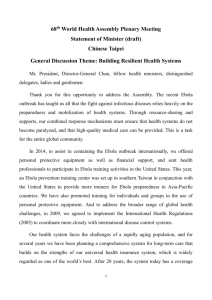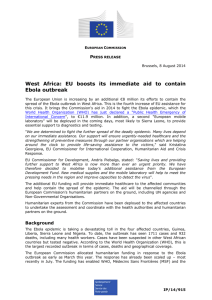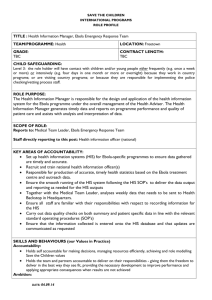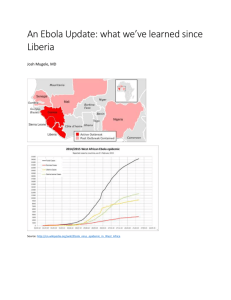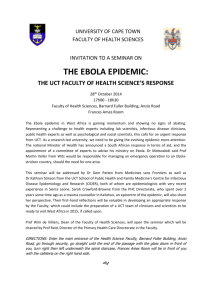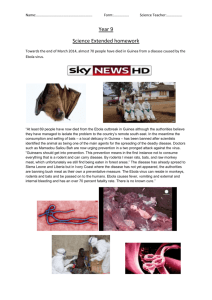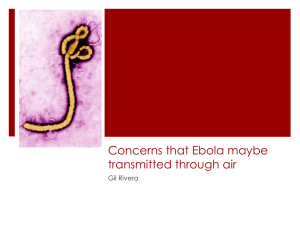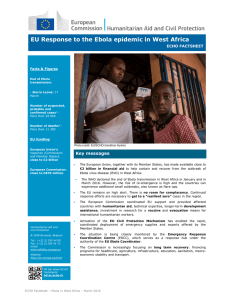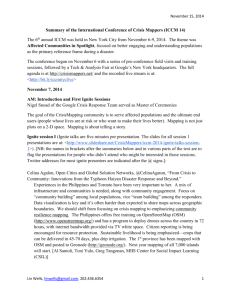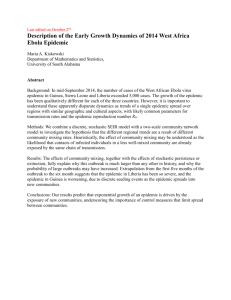DOC - Europa
advertisement
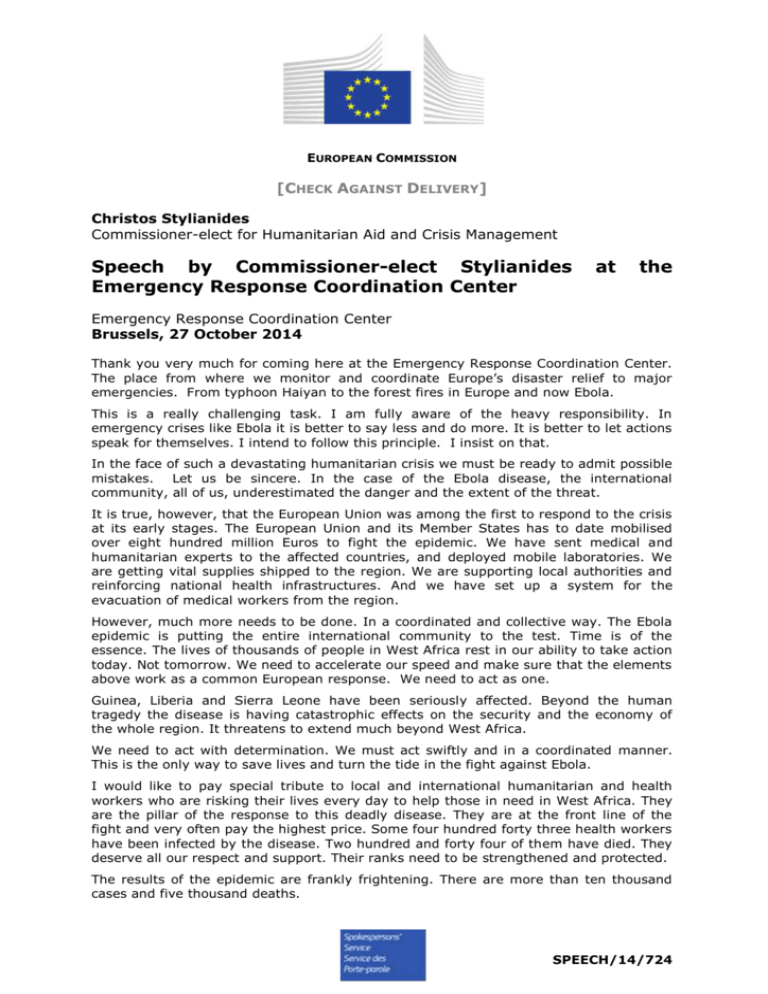
EUROPEAN COMMISSION [CHECK AGAINST DELIVERY] Christos Stylianides Commissioner-elect for Humanitarian Aid and Crisis Management Speech by Commissioner-elect Stylianides Emergency Response Coordination Center at the Emergency Response Coordination Center Brussels, 27 October 2014 Thank you very much for coming here at the Emergency Response Coordination Center. The place from where we monitor and coordinate Europe’s disaster relief to major emergencies. From typhoon Haiyan to the forest fires in Europe and now Ebola. This is a really challenging task. I am fully aware of the heavy responsibility. In emergency crises like Ebola it is better to say less and do more. It is better to let actions speak for themselves. I intend to follow this principle. I insist on that. In the face of such a devastating humanitarian crisis we must be ready to admit possible mistakes. Let us be sincere. In the case of the Ebola disease, the international community, all of us, underestimated the danger and the extent of the threat. It is true, however, that the European Union was among the first to respond to the crisis at its early stages. The European Union and its Member States has to date mobilised over eight hundred million Euros to fight the epidemic. We have sent medical and humanitarian experts to the affected countries, and deployed mobile laboratories. We are getting vital supplies shipped to the region. We are supporting local authorities and reinforcing national health infrastructures. And we have set up a system for the evacuation of medical workers from the region. However, much more needs to be done. In a coordinated and collective way. The Ebola epidemic is putting the entire international community to the test. Time is of the essence. The lives of thousands of people in West Africa rest in our ability to take action today. Not tomorrow. We need to accelerate our speed and make sure that the elements above work as a common European response. We need to act as one. Guinea, Liberia and Sierra Leone have been seriously affected. Beyond the human tragedy the disease is having catastrophic effects on the security and the economy of the whole region. It threatens to extend much beyond West Africa. We need to act with determination. We must act swiftly and in a coordinated manner. This is the only way to save lives and turn the tide in the fight against Ebola. I would like to pay special tribute to local and international humanitarian and health workers who are risking their lives every day to help those in need in West Africa. They are the pillar of the response to this deadly disease. They are at the front line of the fight and very often pay the highest price. Some four hundred forty three health workers have been infected by the disease. Two hundred and forty four of them have died. They deserve all our respect and support. Their ranks need to be strengthened and protected. The results of the epidemic are frankly frightening. There are more than ten thousand cases and five thousand deaths. SPEECH/14/724 I want to reaffirm my commitment to go to the affected countries. To be present on the ground. I plan to visit the region in the second week of November. To express our solidarity in person. This will allow me to better assess the needs and gaps in our efforts. It will help decide our next steps. My presence on the ground will underline that fear and isolation is not an option. That our solidarity is real and tangible. Words are not enough. What is needed is action. Collective action. A huge relief effort is under way but there are still big gaps. My job as the EU Ebola Coordinator will be to identify these gaps and assess what Europe can do to fill them. Of course we need to provide funding, but above all we need to mobilise in-kind assistance. This, however, is not a one-man operation. Therefore, I will work closely with our Member States. Especially, with colleagues in the Ministries of Foreign Affairs, of Health, of Development and those in charge of civil protection. There is tremendous expertise and capacity in the Member States and in the Commission on which we can draw to address the needs. A Task Force has already been created. All relevant services in the Commission, our delegations in the affected countries through teleconference, the European External Action Service, the Member States and humanitarian partners contribute to this task force. The ERCC is functioning as a clearing house for assets, medical volunteers and evacuation of staff. Moreover, with Vice President Mogherini and the rest of my colleagues in the College I will work hand-in-hand in order to be responsive to all the needs. With Vytenis Andriukaitis, Commissioner for health, we will work on the protocols, hospital bed inventory, information systems linked with the ERCC, the Emergency Health Committee, etc. And on all aspects related to protecting European citizens. With Carlos Moedas, Commissioner for research, we will see how to accelerate the creation and production of a vaccine. The EU is providing funds to these initiatives to try to help the speedy and safe development of these potentially life-saving drugs. More than twenty four million euros have been made available through a fast-track procedure for this purpose. With Transport Commissioner Violeta Bulc we will take up urgent matters related mainly to the aviation and maritime sector in order to keep the connections with West Africa open. With Neven Mimica, Commissioner for Development, we will make sure that sufficient frontloading of budget support is provided. We will start working on the long-term support for the countries hit by the epidemic. And make sure that neighbouring countries are well prepared against the spread of the disease. Most importantly, with the High Representative Federica Mogherini, we will make sure that there is joint action to raise political awareness in countries and in the region. At the same time, I will make sure our response is linked to that of our international partners: the UN, the African Union and the USA. The UN Special Envoy David Nabarro, the Special Representative of the Secretary General Anthony Banburry, who is the Head of the UN Mission for the Ebola Emergency Response and the Executive Director of the World Health Organization Margaret Chan. Needless to say that I will be in close communication with the Special Envoys that many of our Member States and the United States have appointed. Such as the German Ambassador Walter Lindner, the French Ambassador Christine Fages, the Dutch Special Envoy Hans Docter and the US Special Coordinator Nancy Powell. 2 What is most needed at this stage is human expertise. The affected countries already had few skilled staff, especially health staff. Not only has the epidemic targeted them but those that are left and those that have come to help are being overwhelmed. They badly need reinforcements. Europe has skilled health staff and technicians who want to volunteer. We will follow up on the call by the European Council to mobilize European medical personnel through the ERCC. Doctors and nurses on the ground are urgently needed. It is essential for health personnel working in the region to know that they will be safely and quickly evacuated if need be. That is why we have, as EU, put in place a system for the medical evacuation of all international health workers. I will work closely with Member States to generate additional capacity for such evacuations. We also need more beds. From one thousand at present to five thousand as soon as possible. Every bed requires eight health and support staff. This means we need to mobilise immediately at least forty thousand staff. Clearly, the European public is concerned about the spread of Ebola to Europe. As we have seen there have been cases in Europe and North America. We need to be vigilant and we need to be prepared. At a time when many doubt the usefulness of Europe, we recently passed legislation that put in place an early warning system for health threats such as Ebola for the whole of Europe. We must not allow fear to dictate our actions. The challenge and the responsibility are huge. But so is my colleagues' and my own determination to succeed. We have no other option but to work together to confront fear, to take action, to eradicate the disease. I have to leave you now in the very able hands of Claus Sorensen, the Director General of ECHO who is at your disposal for further details. Thank you very much. 3

